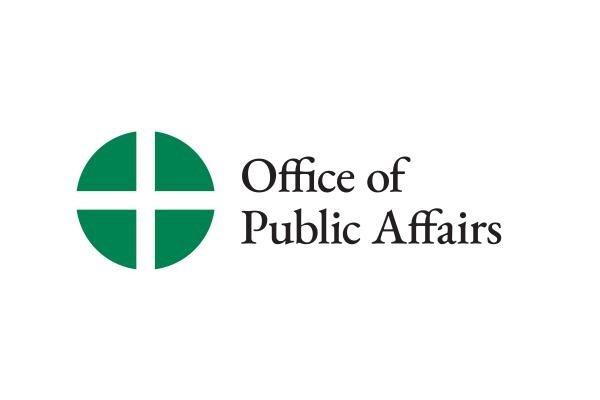Bishop Pates to Secretary Kerry: United States Must Change Trade and Economic Policies, Stop Drugs and Arms Flow to End Border Crisis
WASHINGTON—The United States cannot separate the humanitarian crisis of many thousands of unaccompanied minors journeying to the U.S. border from root causes in Latin America, many generated by U.S. policies, said the chairman of the U.S. bishops’ Committee on International Justice and Peace in a Ju
July 24, 2014
WASHINGTON—The United States cannot separate the humanitarian crisis of many thousands of unaccompanied minors journeying to the U.S. border from root causes in Latin America, many generated by U.S. policies, said the chairman of the U.S. bishops’ Committee on International Justice and Peace in a July 24 letter to Secretary of State John Kerry. The letter from Bishop Richard E. Pates of Des Moines, Iowa, followed the bishops’ June 24-July 2 travels in Honduras, Guatemala and El Salvador.
“The crisis on our borders will not be minimally resolved until drugs and arms flows, harmful trade provisions, and other critical economic policies that contribute to violence are addressed and rectified,” Bishop Pates wrote. He noted that Church leaders and U.S. diplomats in each country agreed that long term resolutions would only come from investment in education and jobs.
“We frequently heard during our visit, from Church leaders as well as representatives of civil society, that the implementation of the Central American Free Trade Agreement (CAFTA), and similar trade policies, had devastated small agricultural producers and businesses in the region, while depressing labor conditions and wages,” Bishop Pates wrote.
Addressing drugs and violence, which often push people to migrate, Bishop Pates wrote, “The United States must recognize our own complicity in this crisis, and support more effective programs that reduce drug usage here at home. Similarly, the regulation of gun exports, coupled with criminal justice reforms that foster rehabilitation rather than retribution, need to be implemented by our states and our federal government.”
Bishop Pates also noted the destructive environmental impact and public health consequences of U.S. and Canadian mining companies in Latin America. He said the U.S. government, working with the Canadians, must hold companies operating in these regions to the same standards of care for human life and the environment as their operations in the United States.
The full text of Bishop Pates’ letter is available online: www.usccb.org/issues-and-action/human-life-and-dignity/global-issues/latin-america-caribbean/upload/letter-to-secretary-kerry-from-bishop-pates-on-central-america-2014-07-24.pdf
The letter is also available in Spanish: www.usccb.org/issues-and-action/human-life-and-dignity/global-issues/latin-america-caribbean/upload/letter-to-secretary-kerry-from-bishop-pates-on-central-america-spanish-translation-2014-07-24.pdf
---
Keywords: U.S. Conference of Catholic Bishops, USCCB, International Justice and Peace, Bishop Richard E. Pates, Latin America, Secretary of State, John Kerry, extractives, mining companies, environment, public health, migration, border, drugs, violence, trade policies, agriculture, Honduras, Guatemala, El Salvador
# # # # #
MEDIA CONTACT
Don Clemmer
O: 202-541-3206
Email
“The crisis on our borders will not be minimally resolved until drugs and arms flows, harmful trade provisions, and other critical economic policies that contribute to violence are addressed and rectified,” Bishop Pates wrote. He noted that Church leaders and U.S. diplomats in each country agreed that long term resolutions would only come from investment in education and jobs.
“We frequently heard during our visit, from Church leaders as well as representatives of civil society, that the implementation of the Central American Free Trade Agreement (CAFTA), and similar trade policies, had devastated small agricultural producers and businesses in the region, while depressing labor conditions and wages,” Bishop Pates wrote.
Addressing drugs and violence, which often push people to migrate, Bishop Pates wrote, “The United States must recognize our own complicity in this crisis, and support more effective programs that reduce drug usage here at home. Similarly, the regulation of gun exports, coupled with criminal justice reforms that foster rehabilitation rather than retribution, need to be implemented by our states and our federal government.”
Bishop Pates also noted the destructive environmental impact and public health consequences of U.S. and Canadian mining companies in Latin America. He said the U.S. government, working with the Canadians, must hold companies operating in these regions to the same standards of care for human life and the environment as their operations in the United States.
The full text of Bishop Pates’ letter is available online: www.usccb.org/issues-and-action/human-life-and-dignity/global-issues/latin-america-caribbean/upload/letter-to-secretary-kerry-from-bishop-pates-on-central-america-2014-07-24.pdf
The letter is also available in Spanish: www.usccb.org/issues-and-action/human-life-and-dignity/global-issues/latin-america-caribbean/upload/letter-to-secretary-kerry-from-bishop-pates-on-central-america-spanish-translation-2014-07-24.pdf
---
Keywords: U.S. Conference of Catholic Bishops, USCCB, International Justice and Peace, Bishop Richard E. Pates, Latin America, Secretary of State, John Kerry, extractives, mining companies, environment, public health, migration, border, drugs, violence, trade policies, agriculture, Honduras, Guatemala, El Salvador
# # # # #
MEDIA CONTACT
Don Clemmer
O: 202-541-3206

